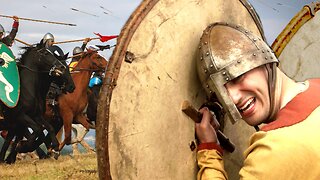Premium Only Content

Pablo Neruda - "Tonight I Can Write" - Read by Elizabeth Ann Langerak - Music by Franz Schubert.
This video is made using MAGIX Movie Edit Pro MX Plus.
Pablo Neruda's Poem, "Tonight I Can Write", translated from Spanish by W.S. Merwin.
Born Ricardo Eliecer Neftalí Reyes Basoalto in the town of Parral in southern Chile on July 12, 1904, Pablo Neruda led a life charged with poetic and political activity. In 1923, he sold all of his possessions to finance the publication of his first book, Crepusculario (“Twilight”). He published the volume under the pseudonym “Pablo Neruda” to avoid conflict with his family, who disapproved of his occupation. The following year, he found a publisher for Veinte poemas de amor y una cancion desesperada (“Twenty Love Poems and a Song of Despair”). The book made a celebrity of Neruda, who gave up his studies at the age of twenty to devote himself to his craft.
In 1927, Neruda began his long career as a diplomat in the Latin American tradition of honoring poets with diplomatic assignments. After serving as honorary consul in Burma, Neruda was named Chilean consul in Buenos Aires, Argentina, in 1933. While there, he began a friendship with the visiting Spanish poet Federico García Lorca. After transferring to Madrid later that year, Neruda also met Spanish writer Manuel Altolaguirre. Together, the two men founded a literary review called Caballo verde para la poesîa in 1935. The outbreak of the Spanish Civil War in 1936 interrupted Neruda’s poetic and political development. He chronicled the horrendous years which included the execution of García Lorca in Espana en el corazon (1937), published from the war front. Neruda’s outspoken sympathy for the loyalist cause during the Spanish Civil War led to his recall from Madrid in 1937. He then moved to Paris and helped settle Spanish republican refugees in Chile.
Neruda returned to Chile in 1938 where he renewed his political activity and wrote prolifically. Named Chilean Consul to Mexico in 1939, Neruda left Chile again for four years. Upon returning to Chile in 1943, he was elected to the Senate and joined the Communist Party. When the Chilean government moved to the right, they declared communism illegal and expelled Neruda from the Senate. He went into hiding. During those years he wrote and published Canto general (1950).
In 1952 the government withdrew the order to arrest leftist writers and political figures, and Neruda returned to Chile and married Matilde Urrutia, his third wife (his first two marriages, to Maria Antonieta Haagenar Vogelzang and Delia del Carril, both ended in divorce). For the next twenty-one years, he continued a career that integrated private and public concerns and became known as the people’s poet. During this time, Neruda received numerous prestigious awards, including the International Peace Prize in 1950, the Lenin Peace Prize and the Stalin Peace Prize in 1953, and the Nobel Prize for Literature in 1971.
Diagnosed with cancer while serving a two-year term as ambassador to France, Neruda resigned his position, ending his diplomatic career. On September 23, 1973, just twelve days after the defeat of Chile’s democratic regime, the man widely regarded as the greatest Latin American poet since Darío died in Santiago, Chile.
Pablo Neruda was an active Chilean Communist and and Atheist. Yet, in his poems he writes the most startling words - words that could come from the Bible itself. In this poem he writes the line, "And the verse falls to the soul like dew to the pasture." I was stunned, so I spoke to my friend, Monty about thie phenomenon and he drew me to Deuteronomy Chapter 32 verse 2, which reads, "My doctrine shall drop as the rain, my speech shall distil as the dew, as the small rain upon the tender herb, and as the showers upon the grass:" (King James Bible) How absolutely beautiful.
The music in this video is provided by Anne-Sophie Mutter. She is a member of The Trout Quintet, which comprises of herself, Daniil Trifonov, Hwayoon Lee, Maximillian Hornung and Roman Patkolo. This music is composed by Franz Schubert: Schwanengesang, D. 957 - IV. Ständchen in D Minor (Arr. for Violin and Piano)
-
 1:20:04
1:20:04
Tim Pool
4 days agoGame of Money
42.6K10 -
 2:21:11
2:21:11
Nerdrotic
10 hours ago $22.20 earnedDown the Rabbit Hole with Kurt Metzger | Forbidden Frontier #090
93.7K19 -
 2:41:13
2:41:13
vivafrei
15 hours agoEp. 251: Bogus Social Security Payments? DOGE Lawsduit W's! Maddow Defamation! & MORE! Viva & Barnes
226K261 -
 1:19:23
1:19:23
Josh Pate's College Football Show
8 hours ago $3.57 earnedBig Ten Program Rankings | What Is College Football? | Clemson Rage| Stadiums I Haven’t Experienced
57.7K1 -
 LIVE
LIVE
Vigilant News Network
14 hours agoBombshell Study Reveals Where the COVID Vaccine Deaths Are Hiding | Media Blackout
1,791 watching -
 1:17:59
1:17:59
Sarah Westall
9 hours agoDOGE: Crime & Hysteria bringing the Critics & the Fearful - Plus new CDC/Ukraine Crime w/ Dr Fleming
46.6K3 -
 45:39
45:39
Survive History
15 hours ago $8.39 earnedCould You Survive in the Shield Wall at the Battle of Hastings?
58.3K6 -
 1:50:28
1:50:28
TheDozenPodcast
14 hours agoViolence, Abuse, Jail, Reform: Michael Maisey
96.7K4 -
 23:01
23:01
Mrgunsngear
1 day ago $5.62 earnedWolfpack Armory AW15 MK5 AR-15 Review 🇺🇸
83.1K12 -
 25:59
25:59
TampaAerialMedia
1 day ago $3.46 earnedUpdate ANNA MARIA ISLAND 2025
52.5K4